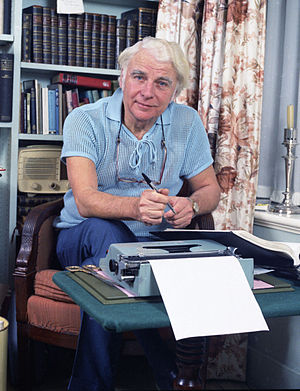(Q58114)
Statements
26 November 1905Gregorian
10 references
25 September 1987
10 references
Emlyn Williams (1905-1987) from Mostyn, Flintshire, was an actor, writer and playwright of international renown. He was born as George Emlyn Williams and started using the name Emlyn Williams in 1927. With the assistance of his French teacher, Sarah Grace Cooke (d. 1964), he won a scholarship to Christ Church College, Oxford, in 1923 (the events were later fictionalised in 'The Corn is Green'). Upon graduating, he pursued a successful acting career, appearing on the stage in 'The Frightened Lady', and becoming a mainstay of the British film industry in the 1930s, working on Hitchcock's 'Jamaica Inn' and other films, writing and appearing in 'The Last Days of Dolwyn' (1949). He wrote and produced numerous stage plays, including 'A Murder Has Been Arranged' (1930), 'Night Must Fall' (1935), 'The Corn is Green' (1938), 'The Wind of Heaven' (1945), and 'Accolade' (1951), and adaptations of Turgenev's 'A Month in the Country' (1957), Ibsen's 'The Master Builder' (1964), and created one-man shows from the works of Saki, Dylan Thomas and Charles Dickens; many of these were reworked as TV plays and films. His stage appearances continued in London, New York and elsewhere. He continued to make TV and film appearances from the 1950s into the 1980s, notably in 'The L-shaped Room' (1962), and 'Emlyn Williams as Charles Dickens' (1983). He also wrote 'George, An Early Autobiography' (1961), 'Emlyn: an early autobiography, 1927-1935' (1974), a non-fiction account of the Moors Murders, 'Beyond Belief' (1967), and the novels 'Headlong' (1980) and 'Dr Crippen's Diary' (1987). He was married to Mary Marjorie (Molly) Carus-Wilson (née O'Shann) (d. 1970) in 1935, and had two sons, Alan and Brook. He was awarded the CBE in 1962. He had many actor friends, including Richard Burton, Noël Coward, John Gielgud, Sybil Thorndike and Lillian Gish.
0 references
